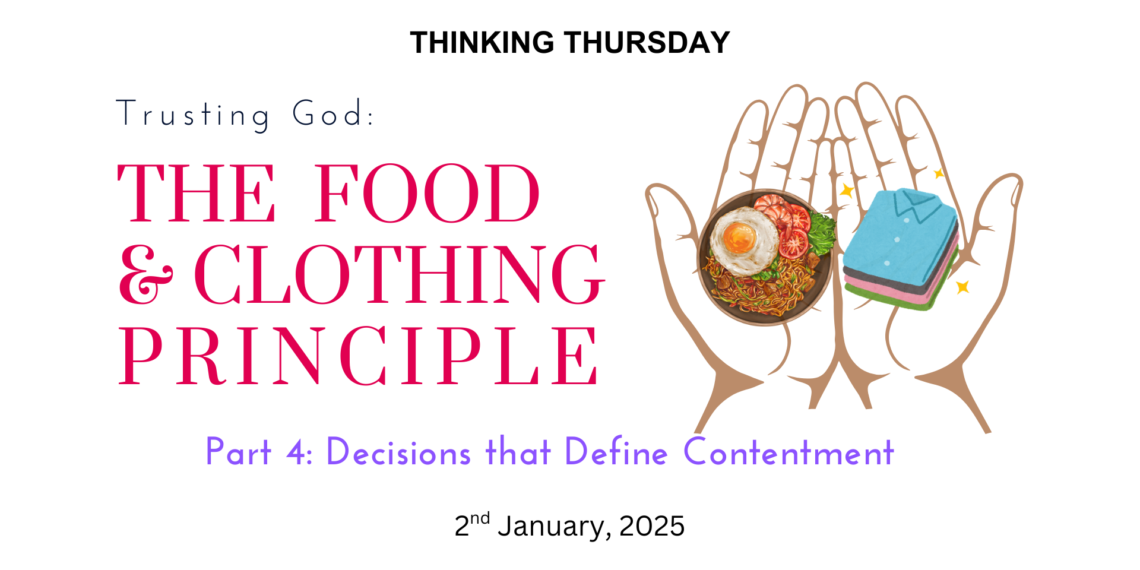DECISIONS THAT DEFINE CONTENTMENT
In the last part, we saw that true contentment is the ability to say, “This is enough, thank you,” without chasing every opportunity for more, even when more might be available or offered.
This time, let us look at various scenarios showing how different people may approach contentment in their unique circumstances.
READ BEFORE: TRUSTING GOD (PART 3)
Scenario 1: The Student and Shoes
A student living on a tight budget has one reliable pair of shoes he could wear for a few more years. However, after receiving an unexpected gift of N20,000 from a relative during the Christmas season, he is tempted to buy two more pairs of the same design. Each pair will cost ₦8,000, which is a significant expense for him.
- The student decides to indulge his desire and buys two more pairs of the same design, enjoying the feeling of having options and the appearance of wealth. However, as the months pass, he realizes that his financial situation has become tighter, leaving him unable to meet other pressing needs. This leads him to regret the decision, understanding too late that the purchase didn’t bring lasting satisfaction.
OR
- The student reflects on the lesson from “Thinking Thursday” and chooses contentment. He buys one pair of shoes for his roommate and invests the remaining money in Christian books that inspire and equip him for his personal growth and ministry. This decision not only enriches his spiritual life but also strengthens his friendship, leaving him with a deep sense of fulfillment and purpose.
READ ALSO: EXAMINATION MALPRACTICE
Scenario 2: Annual Phone Upgrades
A young professional earns a modest income and is persuaded by advertisements and social pressure to upgrade her phone every other year. However, she recognize that their current phone still serves its purpose, and the latest model won’t significantly improve their life. They decide to save the ₦150,000 they would’ve spent on a new phone and instead use it to pay for a professional certification course that enhances their skills and career prospects.
- The young professional succumbs to the pressure and purchases the latest phone, excited to showcase the sleek new device. While the phone garners admiration, they soon face financial strain and are unable to afford the professional certification course they had considered. This limits their career growth, and they realize the upgrade was more of a status symbol than a necessity.
OR
- The young professional resists the temptation and decides to stick with their current phone, which still functions well. They channel the ₦150,000 into a professional certification course, gaining new skills that enhance their career. Over time, this decision leads to better job opportunities and financial stability, proving far more rewarding than a temporary gadget upgrade.
READ NEXT: TRUSTING GOD (PART 5)
Scenario 3: Hair Styling
A busy entrepreneur is tempted to try out expensive hair styling services that cost ₦20,000 per session.
- The entrepreneur indulges in the expensive hair styling sessions, enjoying the luxurious experience and the admiration it brings. However, the recurring expense strains their budget, leaving less room for investments in their business or meaningful activities. Over time, they feel a sense of regret for prioritizing vanity over lasting value.
OR
- The entrepreneur decides to skip the luxury styling and reallocates the money towards hosting a fellowship gathering for friends and colleagues. They share insights from their entrepreneurial journey and faith, creating an atmosphere of mutual encouragement and spiritual growth. This choice fosters deeper connections and spreads values that go beyond appearances.
What would YOU do?
Watch: Enter Marriage a Pessimist










